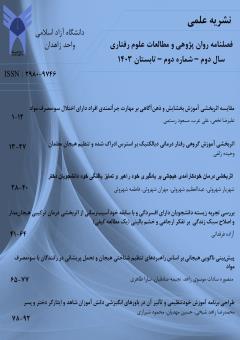مقایسه اثربخشی آموزش بخشایش و ذهنآگاهی بر مهارت جرأتمندی افراد دارای اختلال سوءمصرف مواد
محورهای موضوعی : روانشناسیعلیرضا نخعی 1 , علی عرب 2 * , مسعود رستمی 3
1 - دانشجوی دکتری گروه روانشناسی، واحد زاهدان، دانشگاه آزاد اسلامی ، زاهدان، ايران.
2 - دانشیار، گروه روانشناسی، دانشگاه سیستان و بلوچستان زاهدان، ایران.
3 - استادیار، گروه روانشناسی، دانشگاه سیستان و بلوچستان زاهدان، ایران.
کلید واژه: آموزش بخشایش, آموزش ذهنآگاهی, مهارت جراتمندی,
چکیده مقاله :
پژوهش حاضر، مقایسه اثربخشی آموزش بخشایش و ذهنآگاهی بر مهارت جراتمندی در افراد دارای اختلال سوءمصرف مواد بود. روش پژوهش نیمه آزمایشی از نوع پیشآزمون، پسآزمون و پیگیری با گروه کنترل ناهمسان بود. جامعه¬ آماری شامل تمام افراد مصرفکننده مواد مراجعه کننده به کمپ ترک اعتیاد شهر زابل بود 45 نفر که نمره آنان در پرسشنامه جرأتمندی راتوس 5/1 واحد انحراف معیار بالاتر از میانگین بود شناسایی و به صورت تصادفی در سه گروه (دو گروه آزمایش و یک گروه کنترل) جایابی شدند. گروه آزمایش اول، آموزش بخشایش12 جلسه و گروه آزمایش دوم، آموزش ذهنآگاهی 8 جلسه دریافت و گروه کنترل هیچگونه مداخلهای دریافت نکردند. داده ها با استفاده از پرسشنامه مهارت جرأتمندی گردآوری و با استفاده از روش تحلیل واریانس با طرح اندازهگیری مکرر(طرح آمیخته ساده) تجزیه و تحلیل شدند. نتایج نشان داد آموزش بخشایش و ذهنآگاهی بر مهارت جراتمندی افراد دارای اختلال سوءمصرف مواد تأثیر مثبت دارند. از طرف دیگر بین اثربخشی آموزش بخشایش و ذهنآگاهی بر مهارت جراتمندی افراد دارای اختلال سوءمصرف مواد تفاوت وجود ندارد، با توجه به اثربخشی دو روش آموزش بخشایش و ذهنآگاهی میتوان از این روش برای افزایش مهارت جراتمندی افراد دارای سوءمصرف مواد استفاده کرد.
The current research was to compare the effectiveness of forgiveness training and mindfulness on courage skills in people with substance abuse disorder. The method of semi-experimental research was pre-test, post-test and follow-up with a heterogeneous control group. The statistical population included all drug users who referred to the drug addiction camp in Zabul city, 45 people whose score in the Ratos courage questionnaire (1984) was 1.5 standard deviation units higher than the mean, were identified and randomly divided into three groups (two groups experiment and a control group) were placed. The first experimental group received 12 sessions of forgiveness training and the second experimental group received 8 The data were collected using the courage skill questionnaire and analyzed using the method of variance analysis with repeated measurement design (simple mixed design). The results showed that forgiveness training and mindfulness have a positive effect on the courage skills of people with substance abuse disorders. On the other hand, there is no difference between the effectiveness of forgiveness training and mindfulness on the courage skills of people with substance abuse disorders, considering the effectiveness of the two methods of forgiveness and mindfulness training, this method can be used to increase the courage skills of people with substance abuse disorders.

